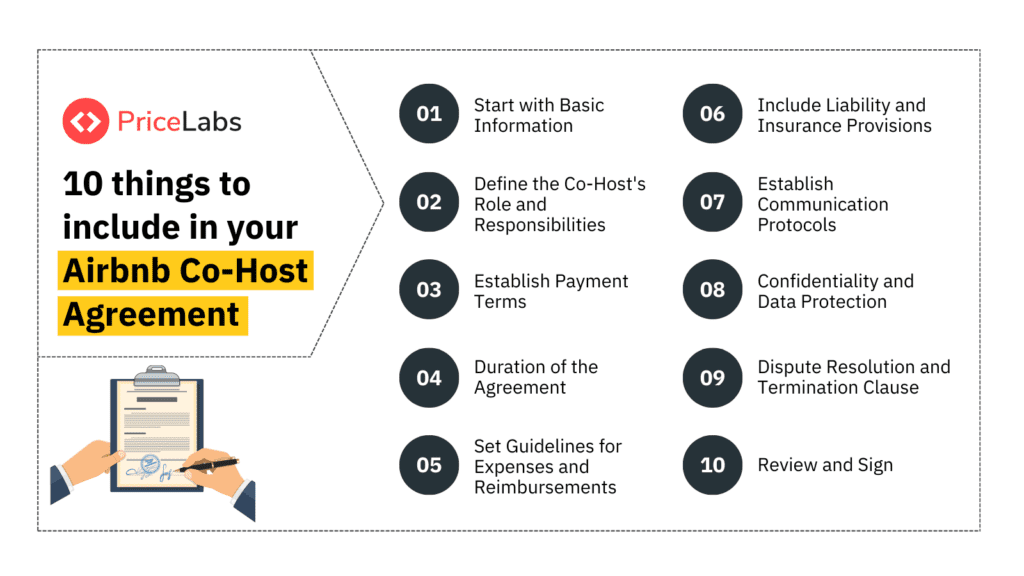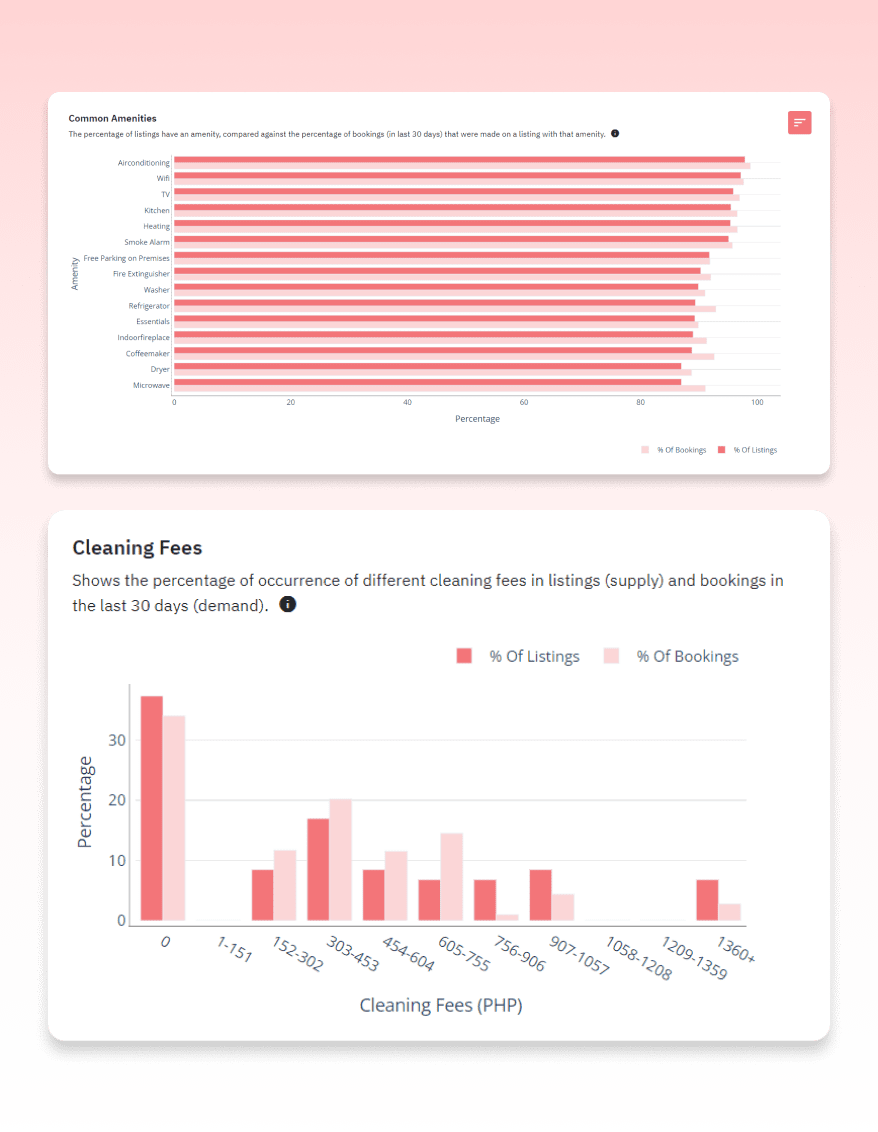Updated: November 8, 2024
As a host, building a successful Airbnb business would have taken all your time and effort, from maintaining your listing to handling cleaning, maintenance, guest reviews, and more. Now that you’ve grown your business, you need help to manage everything, and bringing in a co-host is the perfect solution. When adding a co-host to your team, setting clear expectations is essential, and an Airbnb co-host agreement can help you do just that!
In this article, we’ll walk you through an Airbnb co-host agreement to help you establish a strong working relationship with your co-host.
What is an Airbnb Co-Host Agreement?
An Airbnb co-host agreement is a formal document that outlines the responsibilities, expectations, and terms between a property owner (host) and a co-host who helps manage the Airbnb listing.
A co-host is someone the primary host trusts to assist with tasks such as guest communication, cleaning, maintenance, and ensuring the overall success of the Airbnb rental.
The agreement ensures clarity and protects both parties by defining the scope of work, compensation, and other important aspects of the partnership.
To help you get started, here’s a free co-host agreement template that covers all the important clauses.
How to Draft an Airbnb Co-Host Agreement?
Drafting an Airbnb co-host agreement is crucial in ensuring a smooth and successful working relationship between you (the host) and your co-host. A well-structured agreement helps set clear expectations, reduces misunderstandings, and protects both parties.


Here’s a guide to help you create an effective co-host agreement:
1. Start with Basic Information
Begin the agreement by including the essential details:
- Host and Co-Host Names: Identify both parties involved.
- Property Address: Mention the property or properties the agreement covers.
- Date: Include the date the agreement is being signed.
2. Define the Co-Host’s Role and Responsibilities
Clearly outline the specific tasks the co-host will handle. This section should be detailed to ensure that both parties understand their obligations.
Typical co-host responsibilities may include:
- Guest Communication: Handling inquiries, bookings, and guest issues.
- Check-In and Check-Out: Coordinating the guest’s arrival and departure.
- Cleaning and Maintenance: Scheduling or conducting cleaning, restocking supplies, and addressing minor repairs.
- Pricing and Listing Management: Updating listing details, managing calendar availability, and setting pricing strategies.
- Emergency Responses: Handling urgent issues, such as repairs or guest emergencies.
Be specific about what tasks the co-host will be responsible for and which ones will remain under your control as the host.
While a co-host can make operations easier, Airbnb pricing tool can make your pricing easier!
Static pricing is the enemy of your Airbnb. Understand your market and competitors, understand seasonality to price your property dynamically
Start your 30-day FREE trial now!3. Establish Payment Terms
Discuss and document the payment structure. This may vary depending on the arrangement, but standard payment options include:
- Percentage of Revenue: A co-host may receive a fixed percentage of each booking’s revenue.
- Fixed Monthly Fee: A set monthly payment for handling all tasks.
- Task-Based Payment: Compensation based on specific duties (e.g., a flat rate per cleaning or check-in).
Ensure the agreement clearly states payment schedules, methods (e.g., bank transfer, PayPal), and additional bonuses or incentives.
4. Duration of the Agreement
Specify how long the co-host arrangement will last. This could be:
- A fixed term (e.g., six months, one year)
- Indefinite with a review period (e.g., a review every three months)
- On a trial basis with the option for renewal after a certain period
It’s also important to include details about how the agreement can be renewed or terminated, especially if performance issues or other concerns arise.
5. Set Guidelines for Expenses and Reimbursements
Clearly outline who will be responsible for expenses related to the property, such as:
- Cleaning fees
- Maintenance and repairs
- Restocking of amenities and supplies
If the co-host is expected to pay for anything upfront, include a reimbursement process with specific timelines and documentation required (e.g., receipts).


Build intelligent, data-driven revenue strategies
While understanding expenses, you should also understand how the market is faring with regards to their costs. Create a Market Dashboard for your market and deep-dive into data-driven insights.
Create your dashboard now!6. Include Liability and Insurance Provisions
To avoid potential legal disputes, the agreement should include provisions related to:
- Liability for damages: Who is responsible if there is damage to the property or issues caused by guests?
- Insurance coverage: Specify whether the host’s homeowner or rental insurance covers the property or if the co-host needs their own coverage.
- Guest Safety: Address emergency procedures and the co-host’s role in ensuring the safety and well-being of guests.
7. Establish Communication Protocols
A successful co-hosting arrangement requires clear communication. Define how and when you will stay in touch. Consider:
- Regular updates on guest stays or property issues
- Preferred communication methods (phone, email, messaging apps)
- Response times for guest queries or urgent matters
8. Confidentiality and Data Protection
Since the co-host will access sensitive information, such as guest details, property codes, and financial information, include clauses that protect confidentiality. You can also include data protection measures to ensure both parties comply with relevant privacy laws.
9. Dispute Resolution and Termination Clause
Disagreements can happen, so include a section that covers:
- Dispute resolution: Steps for resolving conflicts, such as through mediation, arbitration, or legal action.
- Termination conditions: Clear terms for ending the agreement, such as required notice periods (e.g., 30 days) or circumstances under which the agreement can be terminated immediately (e.g., breach of contract, unethical behavior).
10. Review and Sign
Once the terms are outlined, the host and co-host should carefully review the agreement to ensure mutual understanding and acceptance. Both parties should sign and date the agreement to formalize the arrangement.
Final Tips for Drafting the Agreement
- Customize the agreement: Every Airbnb hosting situation is unique, so customize the agreement to suit your specific needs and relationship with the co-host.
- Consult a lawyer if needed: If you’re unsure about any legal implications, it’s wise to have a lawyer review the agreement to ensure everything is legally sound.
Drafting a detailed and precise Airbnb co-host agreement establishes a solid foundation for a smooth and successful partnership.
Ensure your Airbnb co-host agreement complies with all relevant laws and regulations. If you need clarification on any legal details, consult a legal expert. Use available templates as a starting point and customize them to fit your unique needs. When finalizing the agreement, ensure you and your co-host understand and agree to all terms. And remember, an agreement isn’t set in stone—regularly review and update it to keep everything running smoothly as your partnership evolves!
Frequently Asked Questions (FAQs)
1. Can a co-host become a Superhost on Airbnb?
To qualify for Superhost status, a host must own at least one home listing. Co-hosts and experience hosts aren’t eligible for this evaluation. Even if a co-host serves as the main manager for a home listing, they can’t earn Superhost status through that role alone.
2. How do I accept a co-host on Airbnb?
In the Listings tab, choose a listing and scroll down to the Co-Hosts section. Here, you can view details about your co-hosts, adjust their permissions, and manage their payouts. You also have the option to invite new co-hosts. For them to accept your invitation, they’ll need an Airbnb account.
About PriceLabs
PriceLabs is a revenue management solution for the short-term rental and hospitality industry. It was founded in 2014 and is headquartered in Chicago, IL. Our platform helps individual hosts and hospitality professionals optimize pricing and revenue management, adapting to changing market trends and occupancy levels.
With dynamic pricing, automation rules, and customizations, we manage pricing and minimum-stay restrictions for any portfolio size. Prices are automatically uploaded to preferred channels such as Airbnb, Vrbo, and 110+ property management and channel integrations.
Every day, we price over 400,000+ listings globally across 150+ countries, offering world-class tools like the Base Price Help and Minimum Stay Recommendation Engine. Choose PriceLabs to increase revenue and streamline pricing and revenue management. Sign up for a free trial at pricelabs.co today.









